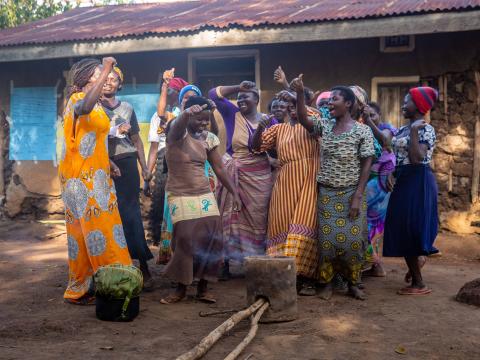The Role of Women Vital in the COVID-19 Era

By Barbara Alupo, Gender and Inclusion Specialist, World Vision Uganda
International Women's Day is celebrated annually on 8 March and offers an opportunity to celebrate the social, economic, cultural and political achievements of women, while also making a call to action for strengthening gender equality and accelerating women’s empowerment.
This year’s theme around building on women’s strength for a better future in a COVID-19 world, highlights the tremendous efforts of women and girls around the world in shaping a more equal future and recovery from the COVID-19 pandemic.
Women take on a central role in the fight against the COVID-19 crisis, as health care frontline workers, caregivers, innovators, community organisers given their exemplary and leadership role in combating the pandemic. The crisis has highlighted both the centrality of their contributions and the disproportionate burdens that women and girls carry.
Women leaders and women’s organisations have demonstrated their skills, knowledge and networks to effectively lead in COVID-19 response and recovery efforts, and this calls for a celebration.
Today, there is more acceptance than ever before that women bring different experiences, perspectives and skills to the table, and make irreplaceable contributions to decisions, policies and laws that work better for all. It is this realisation that drives the targeting of women and girls as critical agents in other aspects such as ending violence against children and fighting child marriages which is closely related to teenage pregnancies.
Building on experiences world over where women’s leadership has been hailed in the fight against the COVID-19 pandemic, World Vision seeks to engage women and girls across Uganda in the 'It takes a world to end violence against children' campaign especially during this COVID-19 crisis. As such, World Vision’s theme for this year’s Women’s Day celebrations is, “The role of women and girls in ending child marriage: Achieving an equal future in a COVID-19 world.”
This is in recognition to the critical role that women and girls can play to see that there is an end to child marriage, child sacrifice and violence against children in Uganda by 2030. The theme alsoncelebrates the tremendous efforts by women and girls around the world in shaping a more equal future and recovery from the COVID-19 pandemic.
It is also aligned with the priority theme of the 65th session of the Commission on the Status of Women, “Women's full and effective participation and decision-making in public life, as well as the elimination of violence, for achieving gender equality and the empowerment of all women and girls”, and UN Womem's flagship generation equality campaign, which calls for women’s right to decision-making in all areas of life, equal pay, equal sharing of unpaid care and domestic work, an end all forms of violence against women and girls, and health-care services that respond to their needs.
At World Vision, we recognise such women and girls; and one of them is Ms Sumayah Nakalyango (19) from Rakai District, a child rights advocate. Ms Nakalyango has been able to expose violence against children and other inequalities during this COVID-19 period.
She engages duty bearers about child protection. She has called out to different stakeholders like faith leaders, government institutions and civil societies to protect children against all forms of child abuse during the pandemic as children are more at risk. She has also encouraged children to speak up about issues that concern them and not fall victims of violence like child marriage, child sacrifice and violence in school.
World Vision, in partnership with like-minded stakeholders, has continued to fight all forms of violence across different regions and the above campaign, we believe, will help reduce all forms of abuse against children especially during this pandemic and beyond.
Late last year, ‘the 16 days against gender-based violence campaign’ was launched in 10 districts, namely Soroti, Nakasongola, Gulu, Kibale, Hoima, Bulisa, Mbale, Tororo, Amuria and Kampala. Different stakeholders were brought on board to participate and commit to protecting children against child marriage, child sacrifice and violence in school.
According to the Uganda Bureau of Statistics, women comprise 52% of Uganda’s population. World Vision, in partnership with other stakeholders, continues to discuss avenues through which women and girls can lead the fight against teenage pregnancy and child marriage, highlighting key considerations, challenges, gaps and opportunities with regard to protecting children from violence in the face of COVID-19 and rally the support of women leaders for the 'It takes a world' campaign initiative.
This is aligned with the child well-being outcome of World Vision in its Uganda National Office Strategy 2021-25, which seeks to increase the number of children who have peaceful and positive relationships in their families and communities.
Realising women’s rights, achieving gender equality and accelerating women’s empowerment is inextricably linked to the strengthening of systems in the fight against vulnerability, increasing protection to children and improving the lives and livelihoods of rural populations, most especially the children.
The progress so far in building gender equality systems at different levels is now threatened by the COVID-19 pandemic which has severely disrupted the economic, political and social efforts by Government, partners and the communities where women and girls live.
Despite this setback, all stakeholders need to work together to maintain and accelerate progress on gender equality. We need to learn from the unique position that the COVID-19 pandemic has presented and to renew efforts to improve the position of women and girls through resilience and optimism.